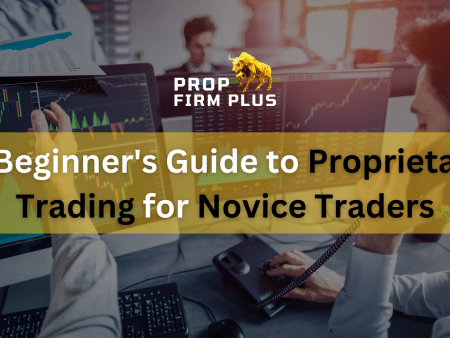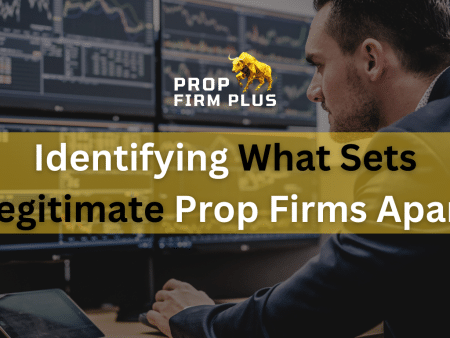
Both novice and seasoned traders have the chance to trade the markets using the firm’s funds and split the gains with prop trading firms. Proprietary trading became more popular than ever thanks to the advantages it provides.
The process of obtaining a funded trading account from a prop firm is rather simple. To operate as a proprietary trader and have the chance to trade with a funded account, anyone who is interested can pretty much apply.
This article will teach you:
- How to become a prop trader and get your trading career off to a great start.
- What it takes to become a prop firm trader.
- Additionally, you’ll learn the advantages and restrictions of becoming a prop trader.
What’s a Prop Trader
Any person who trades the financial markets using the capital of a financial firm is, in essence, a prop trader. Prop trading companies enable proprietary traders to utilize the capital of the firm to generate profits, which are then shared with the funding party according to a predetermined plan.
Prop traders usually concentrate on a single market or product, such as futures contracts, stocks, options, ETFs, and commodities. Prop trading firms typically don’t give their contractors a base compensation. This is to help their prop traders in concentrating just on achieving the greatest trading outcomes, some however, provide a limited monthly income. Having stated that, a predetermined portion of your monthly returns will be profit. As the majority of prop firms provide a split profit proportion ranging from 25% to 50%, but some companies provide a higher profit distribution of up to 90% such as Topstep.
How Can Traders Get Funded?
Prop trading has never been simpler or more reasonably priced to enter. Online traders can use the tools of numerous firms to trade from any location. Prop firm trading can be achieved in two main methods, depending on the company you work with. These two techniques are:
- The interview procedure
- The assessment and challenge procedure
The Interview
You must apply for a funded trading program by completing a form and providing the prop firm with information about your background, degree of education, and trading experience in order to be selected as a funded trader. You may need to go through the interview process as the potential prop firm goes over your preferred trading market, preferred trading strategy, and trading talents.
Your evaluation period, which typically lasts between 30 and 60 days for online proprietary trading firms, can begin as soon as you successfully complete the application procedure. To advance to the next round, prop traders must demonstrate during this time that they can turn a profit and fulfill the demands of the business.
The Evaluation / Challenge
You merely need to demonstrate to your prop firm that you can turn a profit by accepting some trading tasks. In a prop firm challenge, the firm provides you with a demo account on which you have to trade and meet a profit target while following their guidelines within a set amount of time.
For example, a prop firm might set a goal to meet an 8% profit target in 60 days without losing more than 10% of your money (max drawdown) or 5% of your capital in a single trading day (max daily drawdown). These challenges are available for purchase from the prop firm of your choosing.
If you successfully complete the challenges, you will receive a funded trading account. The prop firm will keep a portion of your trading gains. Profitable traders who lack the necessary funds and experience can nonetheless obtain funded capital access thanks to this method.
What Is the Average Earning of Prop Traders?
The subject of how much money can a prop trader make is frequently asked. The quick answer is that your trading performance is what mostly determines your salary, which differs depending on your location. Because they are compensated by splitting their profits with the prop firm, traders have the potential to create unending profits. According to Comparably, the US prop trading salary range is $22,032 to $179,124. The median pay for a prop trader is $46,251 per year.
Three Ways to Develop a Proprietary Trading Career
Although it’s not always necessary, some proprietary traders choose to enter the industry through the traditional method and utilize a bachelor’s degree. Prop trading can be entered in a variety of ways though, particularly with the growing popularity of remote work. Among them are:
Funded Trading Account
Numerous trading programs have been developed in recent years to provide traders with an online funded trading account. A funded trader may be eligible to receive an account using the company’s money by submitting an application to one of these programs.
The potential trader has access to a fully funded account with a specified account size and the company’s resources after they qualify and fulfill all of the prop firm’s standards. Following that, prop traders are subject to an assessment phase in which they are required to adhere to specific pre-established criteria and regulations on risk management.
Funded trading is one of the finest ways to begin a trading profession, but there are important things to think about before applying to a program, they are discussed below.
Prop Trading Firm
The traditional path to becoming a prop trader is to obtain a bachelor’s degree, look for a reputable investment bank or top trading firm, then begin the application process.
Prominent prop trading companies typically offer an internship program lasting from six to twelve months, during which time they offer guidance and instruction. You can discover new trading techniques and styles, along with a lot more, with this coaching. Furthermore, traders are not obliged to keep a profitable account balance during the training time. Rather, they must acquire all the knowledge required to become experts in a certain market, understand the risk management guidelines established by the prop trading firm, and create a trading strategy and style.
Investors
Finding investors ready to fund your account on your own is the last method to become a prop trader. Typically, in order to convince potential investors that you can make money for them, you need to have a track record of successful trading. Additionally, this approach necessitates obtaining funding through various networks and establishing connections with hedge funds or major investors.
Before Becoming a Prop Trader, Consider the Following Factors:
Monthly Fee: Prop trading firms typically charge a monthly fee for offering a funded trading account, which balances their risk. The profit split percentage varies, with some offering a higher share profit percentage of up to 90%.
Trading Guideline and Risk Management Rules: Prop trading firms have different trading guidelines and risk management rules, which should be carefully examined by traders before the fact.
Trading Fees: Prop trading firms charge fees for platforms, markets, and hidden fees.
Scaling Plan: Prop trading firms typically offer a scaling plan to allow traders to grow and increase their account size based on their success.
Basic Income: Prop trading firms often offer a base monthly salary to cover basic costs and focus on trading success. However, remote firms are rare. To secure a stable income, traders must join large trading firms, work traditional office hours, and collaborate with other traders.
Credibility: Ensure the prop trading firm has good user reviews and a positive reputation by visiting their website, checking their terms and conditions, and checking rating forums like TrustPilot.
What Advantages and Drawbacks Come with Becoming a Prop Trader?
Here are a few of the most important advantages and disadvantages to take into account:
Pros
- Simple prerequisites for entrance.
- Provides a large profit opportunity.
- An exciting position.
- Possession of substantial financial resources, technology, and capital.
- No capital risk.
- Minimal trading costs.
- You learn how to trade and discover your psychological strong points and limitations.
- Rebate programs.
Cons
- Fierce rivalry.
- There is typically no basic income.
- A very demanding profession.
- High-frequency trading (HFT) and automated trading robots have made proprietary trading much more difficult.
- Certain trading companies have hefty monthly fees.
Does Becoming a Proprietary Trader Require Any Specific Qualifications?
To become a prop trader, you often don’t need a college degree or other specific credentials. Paper qualifications are typically not strictly regulated by proprietary trading firms. Rather, they are searching for variety inside a team, and frequently, this means that every member possesses a unique set of experiences and backgrounds.
What’s the purpose Behind Proprietary Trading?
Simply put, prop trading lays down a win-win scenario for both parties involved. The goal of proprietary trading for financial institutions, hedge funds, and individual investors is to use the capital and other technology resources of the business to execute a profitable balance sheet overall, i.e, to make money as they have no clientele. On the other hand, prop traders benefit from the previously mentioned advantages the funded accounts or programs supply them with.
Moreover, proprietary trading is seen by exchanges and financial market regulators as an attempt to create a more functional market and increase market liquidity. As a result, exchanges provide monthly rebates to numerous prop trading companies, which are proportionately awarded to their prop traders for boosting market liquidity.










